In September of 1972, the best Canadian hockey players matched up against the best of the Soviet Union. When Canada defeated the Soviets in the final game of the 8-game series to close out 4-3-1, legends were born. Many Canadians consider the victory to be a key contribution to the success of Western nations in the ideological Cold War against the Soviet Union. But that’s a stretch. It was some very good hockey. That’s the truth.

”I was amazed. In my whole life I’ve never been kicked in a hockey game, until now. I looked down and there he is kicking at me. He got me one good one, good enough that it left a welt on my shin, right through my shin pad.” - Gary Bergman on his in-game spat with the Soviet’ Boris Mikhailov
15 years later in 1987, the emotional echo catalyzed another legendary bout between Canada and the still Soviet Union. Later dubbed The Punch-up in Piestany, Canada’s best juniors played the best Soviet youngsters in what many consider to be the most violent game of hockey ever played. It took place in the region of Piestany, Czechoslovakia during the 1987 World Junior Hockey Championships.
The on-ice behaviour escalated beyond reason. It featured a Canadian scoring forward streaking across the ice on his knees making machine gun motions at the Soviet bench, curses, slashes, whacks, elbows, punches, hits, kicks, and much, much more. In the heart of it it all, deep in a brutal second period, the game reached a fever-pitch and a full on brawl erupted.
In Canadian hockey culture there is “The Code”. The Code is the unspoken rules of engagement in the extra-curricular art of playful-yet-serious hockey fighting.
Bert Templeton, who had the well-earned nickname “Dirty Bert”, coached the Canadian team. Vladimir Vasiliev, who did not have a nickname of which anyone in the West was aware, coached the Soviets. Dirty Bert knew The Code, maybe even helped write it. Vasiliev did not.
The Code says: If you hit one of our good players, then you will have to fight. If you play outside of the rules, do violent things with your stick, hit unsuspecting players, hit too far outside your weight class, then you will have to fight. If a fight breaks out and you’re on the ice but not part of it, grab a guy on the other team, tussle with him a bit, but keep it easy. If you are the one fighting and your opponent falls into a vulnerable position, ease up. If you know they have an injury, let up a little. Look tough, send a message, have fun, do your best, but don’t actually try to hurt a guy. Just beat him up a little. Hurt the man’s pride. That’s The Code.
So, back to the brawl. How did we get here? Well, with all the hype and dangerous Nationalism percolating around the contest, and with words of bile flying from the mouths of the Canadian team and media, the Soviet kids expected blood. And who could blame them?
The Soviets were young, scared and strong. And they knew fights were coming, and they were ready to fight. Actually fight. For most of them knew nothing of the subtleties of The Code.
Back at home, for the Canadian boys, a raucous bout on the ice could end in either glory or emotional letdown. Even with a dire loss, most would retur back to a strong life. Food to eat, secure communities, jobs, even fame and riches.
For the Soviets, home was different. Hockey was their role. To win was their contribution, and failure meant more than the loss of a game. The consequences were more real, more far reaching, and carried real risk. The circumstances to which many would return were far less glamorous than their Canadian counter-parts. And so who can blame them, then, not only for standing up for themselves, but for doing so with the urgent zeal of deep national pride?
Thus Russian player Vladimir Konstantinov head butted Canadian defensemen Greg Hawgood right in the nose, breaking it, in an outburst of emotion. Canadian hockey legend Brenden Shanahan described it as: “The greatest head-butt I’ve ever seen”, and a thing of beauty it was.
After that, it happened. The Canadian goalie tried to intervene and then took a fierce Soviet right-hook, and 18 Canadians flew over the bench in support. From the other bench 18 Soviets followed. And then brawl.
Players from both benches spilled onto the ice, each finding a dance partner to engage in genuine, uninhibited fisticuffs. The Code went out the window, lost somewhere in translation. As the fights reached a passionate peak, and serious injury seemed all but guaranteed, the overwhelmed facility operators turned off the lights to try to quell the unwieldy violence.
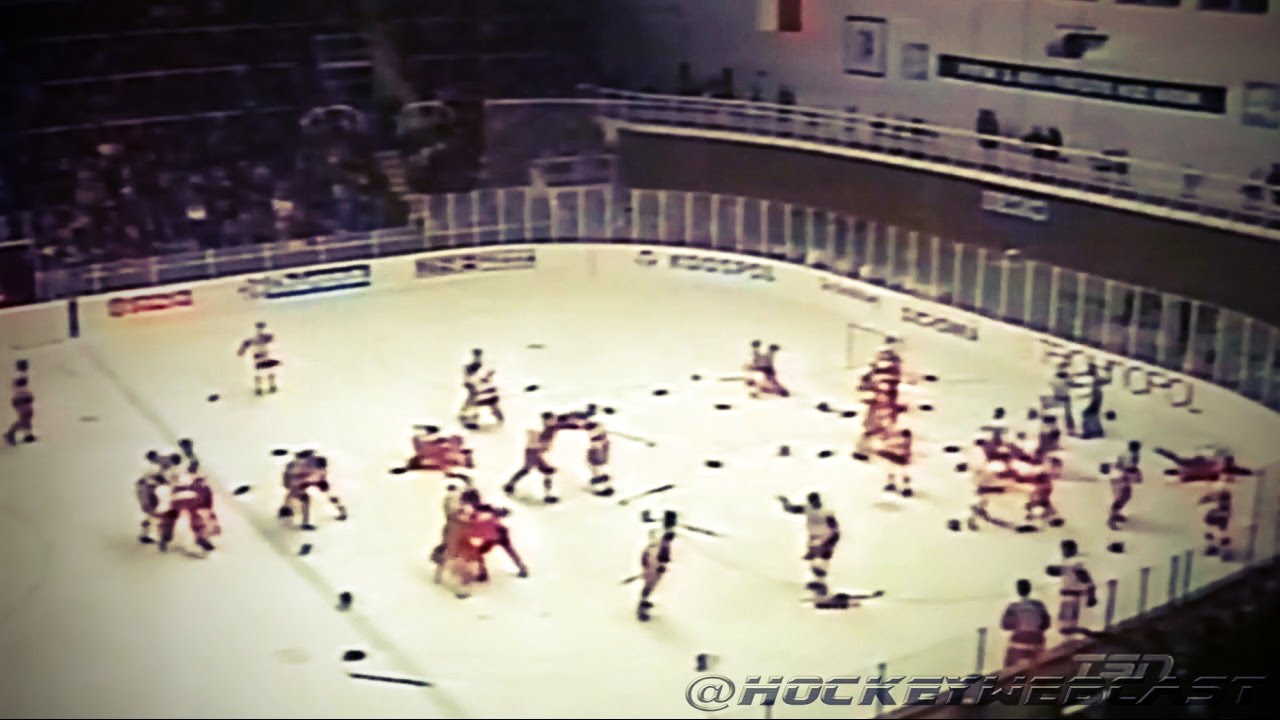
It turns out, a fact which any mother could tell you, that putting 40 under-20 year old kids embroiled in violence in the dark does not, in fact, cause them to stop fighting. They become their shadows. Sinister acts were performed under this cloak of darkness, but yet, after a time the battle wound down. Adrenaline expunged.
As the light returned and the combatants slowly separated, disappointed fans shouted: “My chceme hokej, my chceme hokej (We want hockey, we want hockey)”. Yet there would be no more hockey, as both teams would forfeit. They were each disqualified from the tournament.
As time moved onwards, the world changed. Hockey changed. The Soviet Union faded into history. Russia re-emerged as a hockey power, and a new generation of Russian-born players emerged. Led by the likes of Alexander Ovechkin, a worthy rival to Canada’s Golden Boy, Sidney Crosby, they showcased their skills and character on the national stage.
They became heros, and I grew up loving them. I didn’t care about the old stuff. The footage wasn’t as good, and the players were slow. Ovie though, that guy was fast.
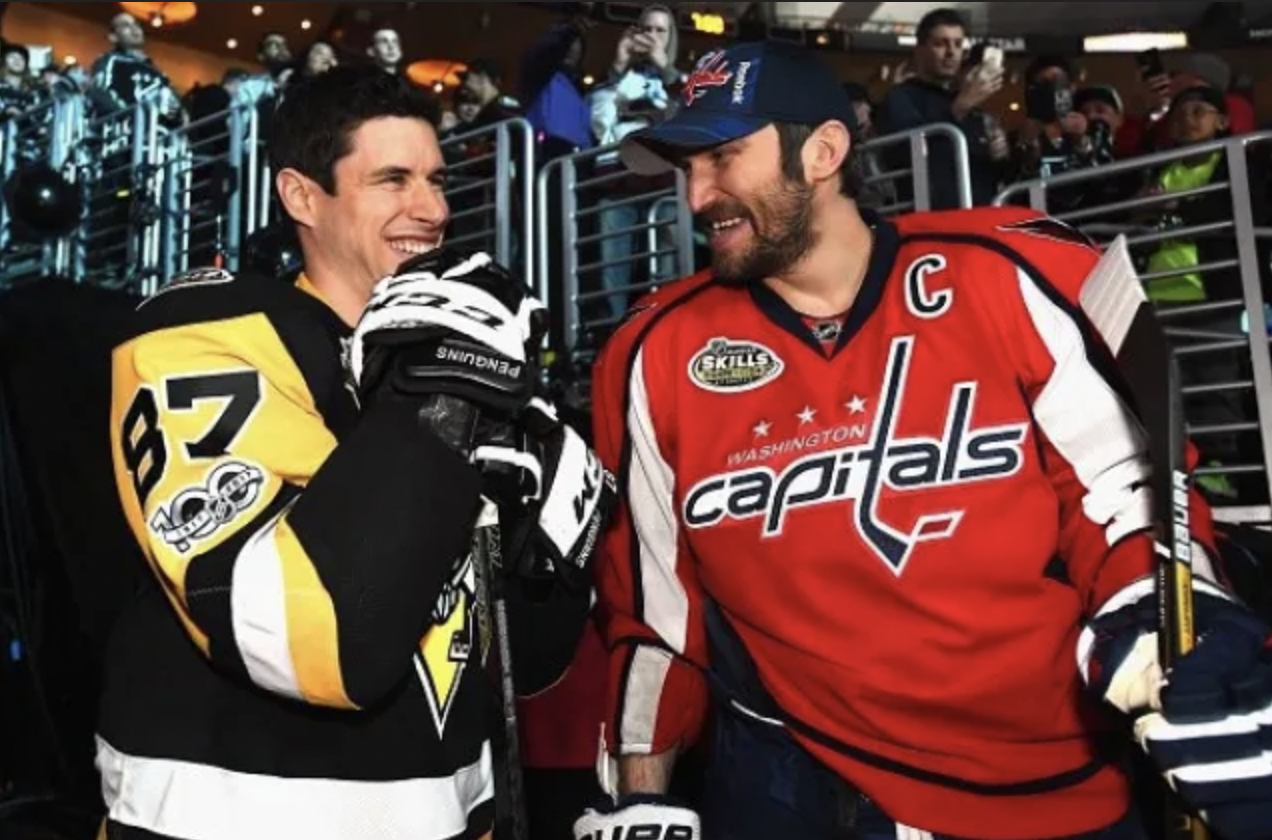
This is how I grew to understand Russia and the Soviet Union as a child lucky enough to grow within a hockey-mad culture. To my eyes, Soviets, Russians, whatever, were never the other. They started as the other team, and then they became teammates. No different from any other. Love em.
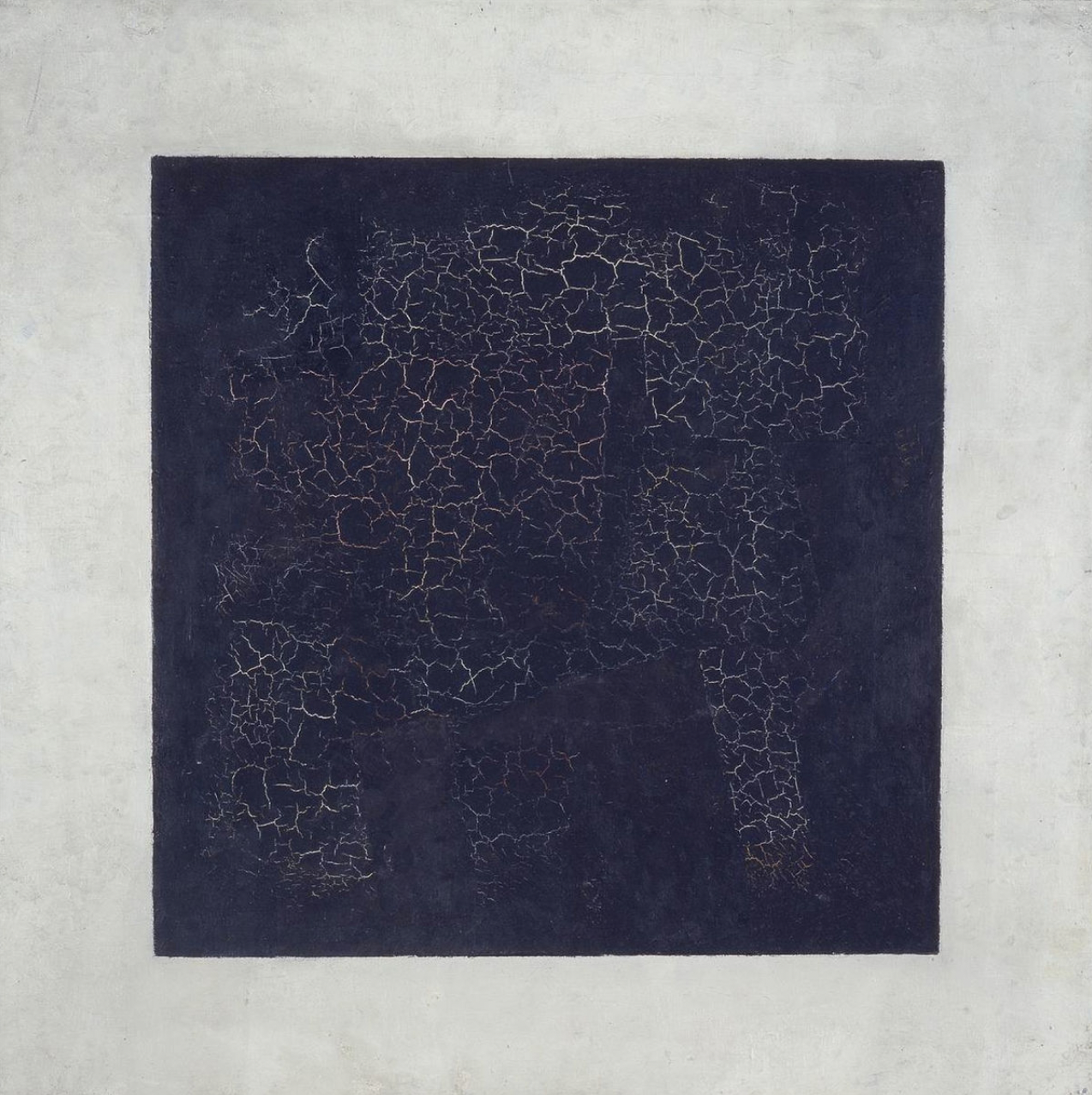
Black Square by Kazimir Malevich
In an ayahuasca hut somewhere, I learned very quickly that my naive, hockey-shaped perspective of the Russian people was not shared by others in the Americas and parts of Europe. From the moment the tour began, despite being in the presence of pure medicine, acceptance, love, and the profound power of jungle life, old resentments and divisions were never far from the surface. It surprised me.
The first Russian group I met was imposing. A dozen people, half very large and burly men, and half women of profound beauty. The English speaking group, made of people from many countries, many who spoke little English, opened amongst itself. It did not open towards the Russian group. The two groups did their best to keep distance.
During the first ceremony, the Russians, together in their side of the maloca (medicine hut), spent the entire time in uproarious laughter. It was a stark contrast to the quiet tension others displayed in their reserved, contemplative, ceremonial silence.
In that first ceremony, the largest Russian — the leader to be sure — and his comrades, spent a full 4 hours laughing the deepest, purest, laughs of enjoyment my ears had ever heard. Deep in the jungle in the pitch black of night, I loved every second of it. The vibrations of their laughter were a key ingredient of what became the most profound and impactful experience of my life.
Yet upon awakening the next day, and reconstructing my idea of reality, I came to learn that many other campers were very upset. “Fun house of horrors”, one of the Americans described their night to me. Throughout the next day, many more would come to me and state their on-the-sly displeasure of the night’s events. “Can you believe it? Being disruptive like that? No respect. Russians…”
Through the plants medicine, the seeds of compassion grow deep. But their fruits may not yet to blossom into one’s conscious perspective. Not here. Not now. Not for them. Not yet. For when the ceremony is over, you return, lighter but with gunk in your engine, wherever you are at, with months and often years worth of integration work ahead, to truly nurture those fruits.
Something about the sheer and obvious intensity of my first night’s experience, and the neutrality of being an amiable Canadian, made the English group look towards me for feedback, even approval, on what had transpired the night prior and the nights that would come. On this, they didn’t get it. But they confessed it all the same.
As the week went by, the division between the English and Russian speakers became more apparent. For many, it was the one something to which they remained identified, the focal point for their inner work.
The Russians ate together, swam together and talked together. There were others from Sweden, the Netherlands, Spain, Finland, and many more places, who all naturally melded as part of the American-dominant “English” group. The two still kept their distance.
But I took no part in sowing division. I’d shrug: “I like Russians”. Or: “I thought it was funny, they had a huge experience.” I’d even be so bold as to mix in a: “Maybe that’s just the medicine, working in Russian.”
I refused to disparage anyone for the tenor of their laughter, or for having a culture that I did not understand. And so I decided to branch out. The next morning, I took a jungle tour with the Russian group instead of the English group.
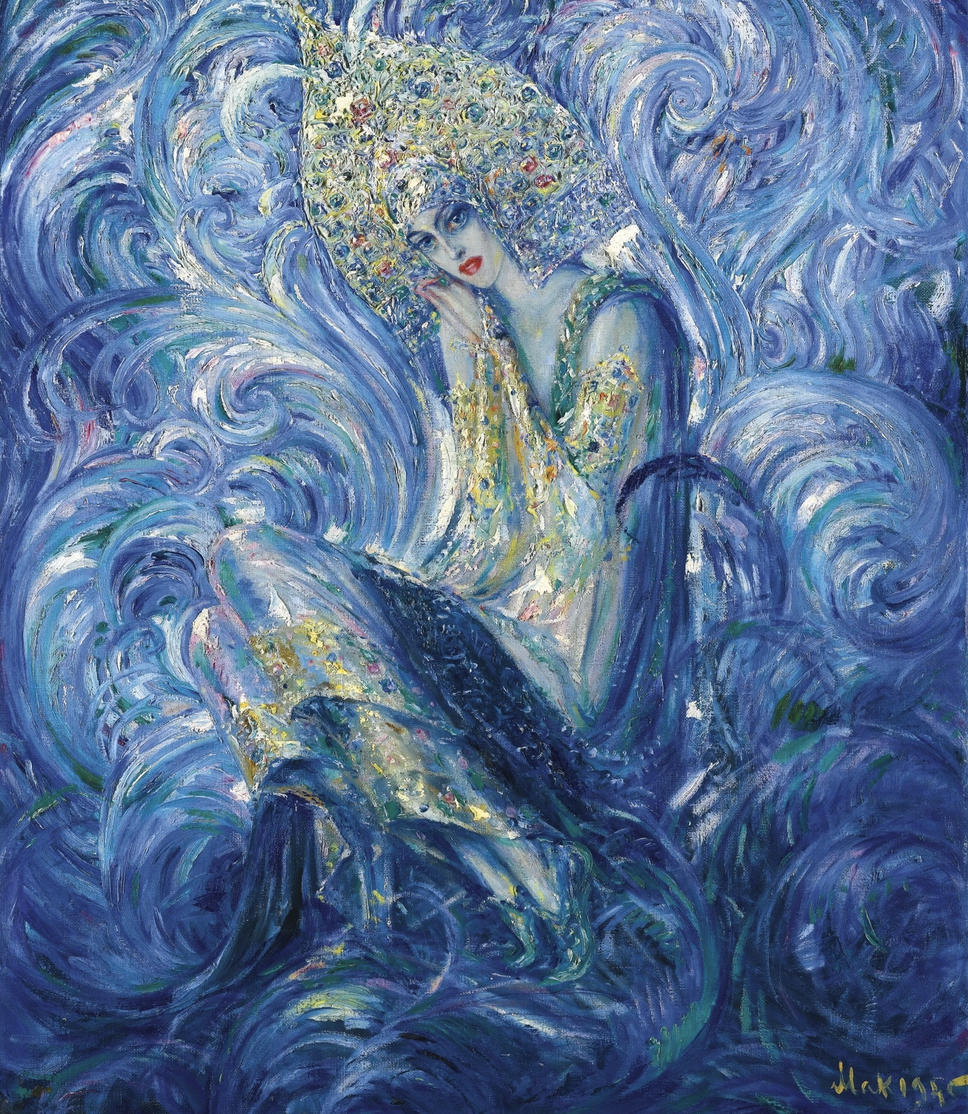
Russian Beauty by Paul Mak
I traveled near the back and made an effort to be present. Yet not too present so to not make them think that I had joined their group just to oggle at the Russian women. Though one should! After the tour, I awkwardly approached the leader of the group. He was loud and proud, he was strong and looked tough.
The men as a whole exuded a communal strength. Their body language was clear and prominent. There was an obvious dominance hierarchy, and clear rules of engagement within it. They were outwards, with much laughing and joking amongst themselves.
I noticed what a felt experience they were having. It was heart led, and out there, not caught rolling around in their minds. It was all outwards, in and part of shared experience, instead of internalized and dissected. The women were confident and graceful, exuding their own quiet strength. And when I approached the leader, who was next to the translator, the others avoided eye contact and scattered. His back straightened, his brow furrowed, and his face made it clear that he had no interest in whatever it was I hoped to do. But I was not deterred.
“I like Russians. Hockey. Summit Series. (Grin) Alexander Ovechkin. Russia good hockey,” I gestured a hockey stick with my hands and gave a thumbs up, with a pleading look at the translator. He, somewhat embarrassed on my behalf, hesitated and then relayed my message. The man did not react. He stared at me. And stared at me.
The other men were nearby, feigning interest elsewhere with ears pointed towards the conversation. A few smirks. The translator gives a smile and a nod, and I take it to mean: “Ok, yep, you can go now”. Still staring.
I walk away, feeling awkward. The translator approaches me within the hour, and tells me: “That was kind. Thank you. They mean well. They feel like everyone hates us because we are Russian.”
Later that day, I join an English group doing yoga. It is me, the instructor, and a pair of American men. In an unexpected turn, the Russian men arrive a few minutes later. Tension fills the room.
The scene which unfolds as they carefully select their yoga mats indicates that they have little-to-no experience with the yogic arts. Yet as usual, they are having fun. One of the Americans, a professor at a prestigious American University, dismayed by the constant undercurrent of indecipherable Russian-speak and laughter, sighs and leaves. The division is a fracture.
I am in the far corner by myself, still feeling somewhat embarrassed by the prior interaction. Yet to my surprise, the leader takes his mat and rolls it out beside my own. His comrades do the same. I am encircled.
Despite the ample room in the yoga hall, they make a point of surrounding me. A part of me wonders whether I will be on the receiving end of a Soviet-era head butt. That soon fades. It is truly preposterous. I return to trying to reciprocate their world view by emphasizing feeling. I put an intention towards keeping my heart is open, and I have no worries. As before, I think their entire schtick is hilarious. I smile. Never have I felt safer.
They are very close to me. And there is no acknowledgement of the closeness. There is ample space elsewhere, but apparently closeness is better. The class begins. The instructor starts with a downward dog and demonstrates a twist, with one hand raised. I plant my hands and my feet, engage the position, and twist my right hand up. The leader beside me does the same, but instead raises his left hand. He is facing me.
Our heads turn towards each other and we lock eyes. Then we share a smile. We both wobble, and struggle to maintain balance in the pose. His hand shoots out for a high-five and mine reflectively does the same. We smash a loud, mid-pose high-five, and then both fall over. Everyone laughs. He looks at me, points his finger between him and I, and shouts: “We same. Hockey. Friend!” — another high-five.
And that was that. He points to himself and tells me his name. He points to his friends, who then each tell me their names. More high-fives still. They point to me. I tell them my name. The other American joins in, we exchange names, and share smiles. The fracture is no more.
After that, the group comes closer together. The next meal of the dining hall is not two tables. There are Russians to my left, and Americans on my right. There is no direct engagement, yet there is sharing, an increasing acknowledgement of sameness. Food is good. Medicine is strange. What are we all even doing here?
Their laughter is no longer grating, it carries music, it transfers joy. It starts to make the Americans laugh. As each person is there to work through their darkness, where they are from, what they believe, and what their history says about them, becomes less and less important.
At night, in the extremes of non-ordinary consciousness, we acknowledge the fundamental interconnectedness of human life. Different experiences, different values, lead to differences in perceptions and feelings. Yet when you strip that away, as the medicine does, there is simple sameness. Pure, unending and loving, and sameness.
Life on this earth is not a contest of ideologies. It is not a contest of teams. It is a storm of individual experiences, thrashing together in a mad scramble to decipher meaning and establish control long enough to savour one moment of the impermanence. As horrors unfold around the world today at tragic scale, we lose sight of the personal struggle to discover the true, shared self.
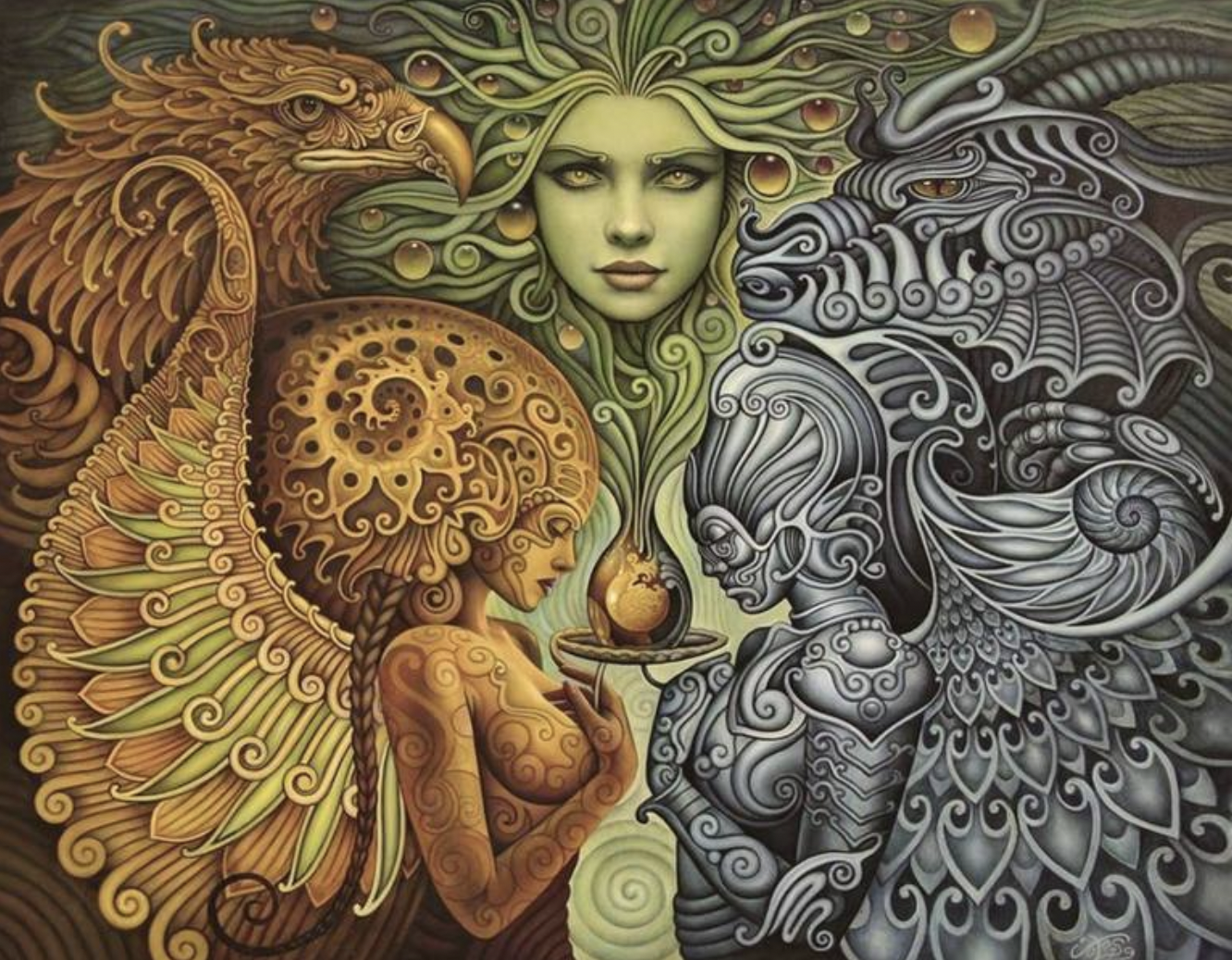
Ab Ovo by Igor Volos
Any one of us can extend a bridge of compassion to another, and it can happen in the most unlikely places. Do not give up. Do not become scared. People are not your enemies. Find the courage to discover for yourself what other believe, and without judgement meet them where they are. Listen, extend, and grow together.
As you see more, and learn more, and then look into the soul of another, you will see more and more of the same, of yourself, and then difference fades. And when another does this in accordance, you both understand the truth beyond the mind’s tricks. There is no separation. That man on the other side is your brother.